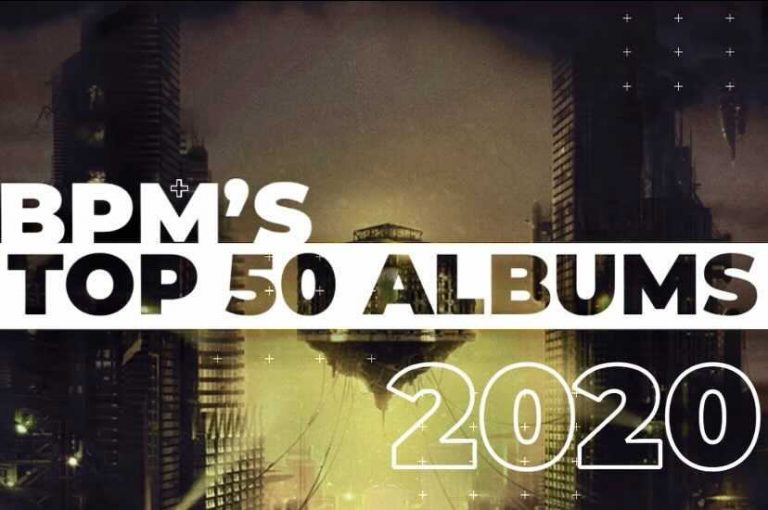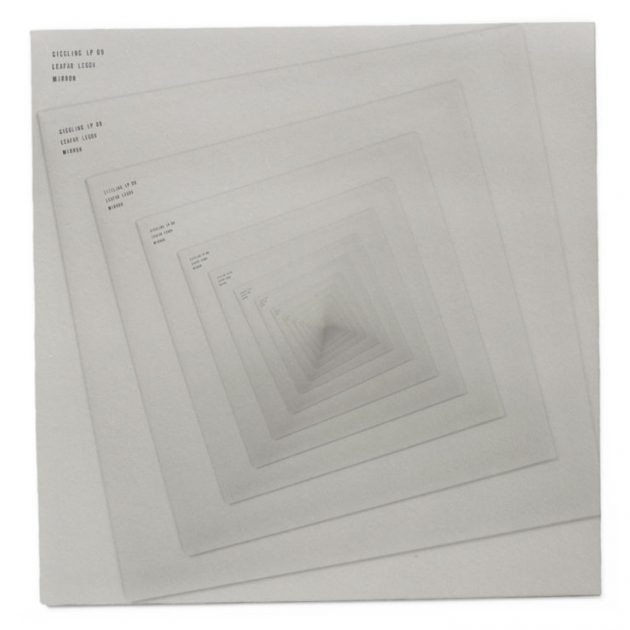
30.
Leafar Legov – Mirror
[Giegling]
“What is essential is invisible to the eye,” a robotic voice exclaims. Echoing Antoine de Saint-Exupéry’s The Little Prince, Leafar Legov‘s electronically explorative Mirror penetrates so much deeper than what one’s five senses can perceive. It is so chock-full of goodness that it’s almost impossible to digest in one listen. It’s delicious gumbo for the ears and brain – or ratatouille if you’re a vegetarian.
This is the kind of musical offering that causes one to pause and ponder “What kind of sorcery is this?” Seriously, there is some genuine musical alchemy at work here. These songs are as soothing as grandma’s lullabies and as complex as Euler-Lagrange equations. It feels like extraordinary care was taken in shaping every second of each song; while listening I find even the delicate percussion patterns to be utterly captivating. Atmospheric ambient textures coalesce with soft and sensual house beats to create a sound that brings this listener to tears, proof that music does indeed possess charms to soothe the savage breast. A long lost friend once uttered the word ‘ambrosial’, and to my ears that word was magic – I haven’t thought about that specific word in years, that is until now. Yes, Leafar Legov, your pandemic album is ambrosial, and I delight in every note and every beat. Indeed, what is essential is invisible to the eye. – Scott Zanassi
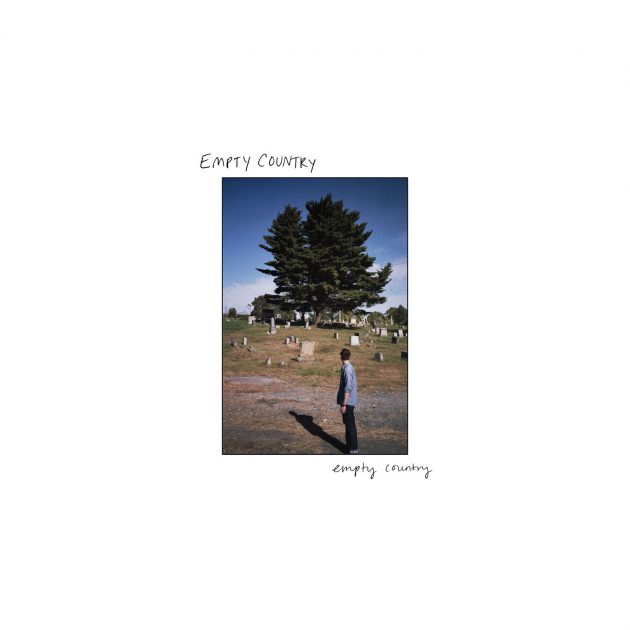
29.
Empty Country – Empty Country
[Get Better]
My heart broke a little when it became clear that Cymbals Eat Guitars were no more. The New Jersey indie rock stalwarts left behind a back catalogue beyond reproach, so it’s nothing less than a miracle that erstwhile CEG frontman Joseph D’Agostino’s debut album as Empty Country is as good as, and in parts even better than, anything he’d put his name to previously. His status as indie rock’s poet laureate already inscribed in stone, D’Agostino still outdoes himself on an album filled with richly-drawn character sketches and turns of phrase that will make you double take and nod with quiet admiration. Show me a line to a song in 2020 that contains more implicit back history and personality than “got a tattoo on my ribcage, of the second plane crashing” and I’ll call you a bald-faced liar.
With the help of family and friends (including Charles Bissell of The Wrens, whose influence has been keenly felt across every CEG record), D’Agostino has put together an LP that pulls his old band’s sound in opposite directions towards distinct poles: the deeply intimate small scale, and the wide-screen spectacle. This approach creates an album that’s rich in texture and variety, even when, as is often the case with D’Agostino’s work, there is an overwhelming preoccupation with death. Make no mistake, Empty Country is a heavy record, but it contains enough boundless empathy and humanity to mend many a broken heart. Even one mourning the demise of a long favourite band. – Andy Johnston
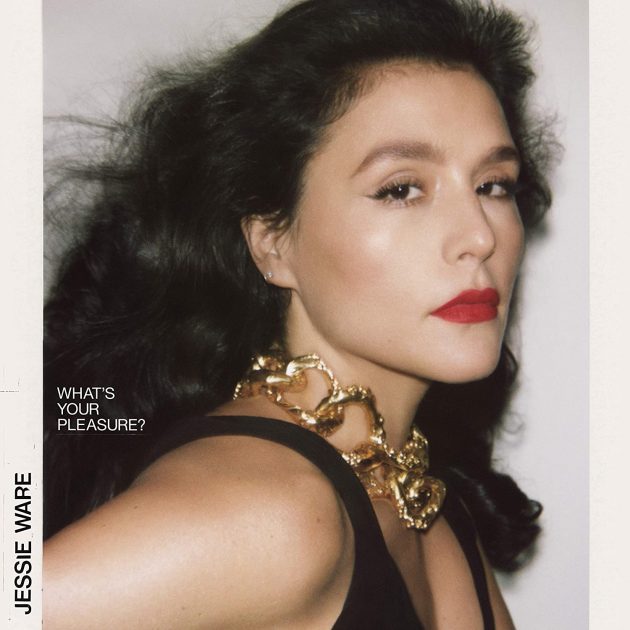
28.
Jessie Ware – What’s Your Pleasure?
[Virgin EMI]
Despite a year of isolation and warning against physical contact, UK singer-songwriter Jessie Ware had the audacity to ask a question through the title of her fourth LP: What’s Your Pleasure? The quest to finding an answer is across the album’s 12 songs, which effortlessly swoon across unapologetic and tantalising disco-pop. A complete deviation from 2017’s domestic love letter and often morose Glasshouse, Ware’s signature sultry vocals glide over throwback dance production that seems a bold reinvention yet a completely natural lane for the singer.
Lyrically, she paints a sonic world that feels as warm and inviting as meeting the demure gaze of a stranger across the dance floor. Refreshingly lacking any cynicism, she sang about resurrected chivalry (“Oh La La”), come hither sexual tension (“Step Into My Life”), and emotional disclosure (“The Kill”). As frustrated as Ware may seem on the lead single “Spotlight” singing: “If only I could let you go / If only I could be alone” this feels like the album’s mission statement. The singer is unwilling to relinquish the possibility of love even with the world collapsing. Upbeat escapism from start to finish, this is truly Ware’s magnum opus. – JT Early
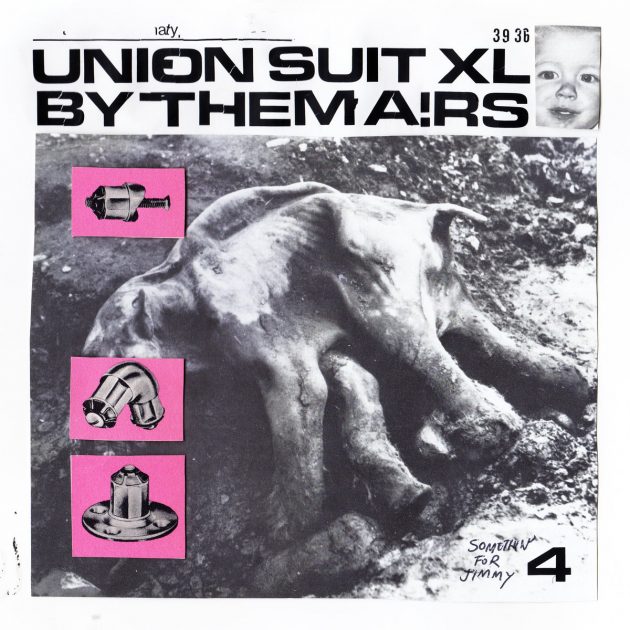
27.
Them Airs – Union Suit XL
[Self-released]
The New Haven, Connecticut outfit Them Airs have a bright future ahead of them. Their album Union Suit XL is idiosyncratic and impeccably executed, bursting with influences yet wholly original. Echoes, clanks and distortions decorate the album’s 35-minute runtime, giving the album a gritty, hardscrabble aesthetic, as if they’re playing in a damp alley. Tracks including “Reception Desk” and “Wade/Cull” change directions without sacrificing a bit of energy, and lead vocalist Cade Williams does more than sing: he chants and taunts and at times just speaks his truth.
Post-punk energy flows abound through Union Suit XL — according to their website, Them Airs members wanted to mimic the harmonies on Wire’s “Map Ref. 41°N 93°W”. Yet their influences hardly stop there; “Innovation Leads to Distinction” calls back to Guided By Voices’ homespun quirkiness, the distorted hooks on “Reciprocate” and the skeletal interlude “Bole” could easily be heard on a Deerhoof record, and tracks like “Food Pyramid” flirt with ska. Them Airs’ oldest members are barely in their 20s, and they already have a second album out this year – it’s exciting to know Union Suit XL is just one of many original works in what could well become an impressive discography from an original band. – Carlo Thomas

26.
Jerskin Fendrix – Winterreise
[untitled (recs)]
Need to know everything there is to know about Jerskin Fendrix in one track? Too bad. But, first timers need not look farther than “A Star Is Born” for an introduction. Internet fame, bedroom production pressure, getting a feature in online magazines, the cruel impact of fame upon the Paul brothers – it’s all there. It sounds like too many topics to cover, but this is exactly what’s going through the minds of many Generation Z musicians. It’s the internet, baby, and it’s tough to make an impact where one hasn’t already been made.
Fortunately for Fendrix (real name Joscelin Dent-Pooley), he has about 100 different ideas on how to make a musical impact. Almost impossibly, he does all of them justice. Opener “Manhattan” is by turns classical piano improvisation, Kanye’s Twisted Fantasy-era autotune dirges, and no wave guitar noodling – this type of multidisciplinary musicianship hasn’t landed so well since “Paranoid Android.” And sure, paranoia may be something that’s negatively affecting Fendrix’s mind, but the fabulous twists and turns of Winterreise suggest that he knows exactly how to transmute and express these frustrations. All the sounds of the internet collected into one debut album that actually sticks the landing after ten songs? Okay, Zoomer. – Michael Cyrs

25.
King Krule – Man Alive!
[XL]
“There’s a massacre across the ocean / I can see it in the palm of my hand,” croons Archy Marshall on his third LP as King Krule. But, he’s not here to tell us some grand solution for cellphone addiction. He merely knows his own strengths and how to tell a story with them. “I think about one little image of me, writing something down or something happening to me and I’m there,” he told The Guardian about his writing process. And yeah, that checks out. There’s no boardroom of record company execs staring Marshall down; it’s just him, in his element, pulling every last string in the artistic process.
Having Marshall as the only driver in the seat is such a nice reprieve for a music machine that seems to emphasize the inclusion of dozens of producers to oversee recording (shoutouts to True Panther Sounds records for bucking this trend). Man Alive!’s mere existence is proof that the singular artistic vision still has a place in modern media. The icing on the cake is that the album is incredibly well done. It flows easily from a paranoid and angry start where bass guitars grimace and scream in Marshall’s presence (“Comet Face”) into an utter peace that lasts the entire back half of the tracklist.
Written as his newborn daughter was still shitting in his lap, Marshall makes a mature transition, via the insurmountable “Alone, Omen 3”, into a renewed faith in humanity and family. The sequencing exquisitely makes this the most compact and shortest King Krule vehicle to date. Man Alive! isn’t necessarily better than the previous iterations of Marshall’s Tom Waits-soaked visions of post punk calamity, but it’s certainly the easiest to digest. Once the ooz of his youth evaporated, he was free, and it shows from track one all the way to the fabulous and cathartic closer “Please Complete Thee”. Marshall responds to major life events with a somewhat more mellowed, accessible record that trades in none of the singular vision that makes King Krule great. – Michael Cyrs
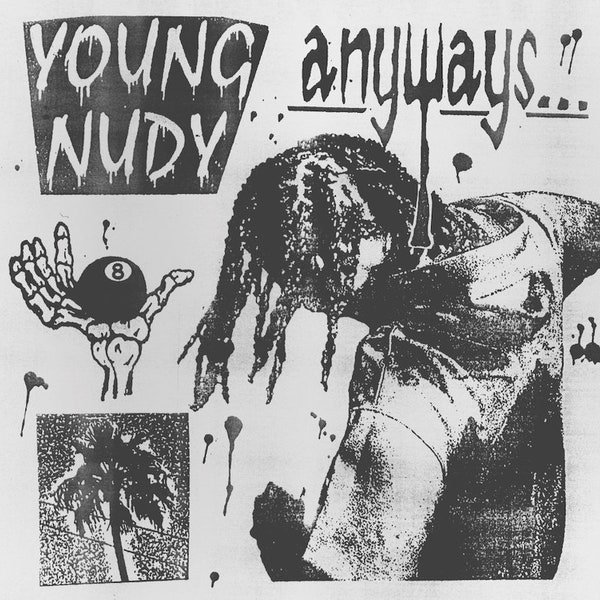
24.
Young Nudy – Anyways
[RCA]
About 50 seconds into Anyways, Young Nudy stops the track to get some shit understood: “You listening to a motherfuckin’ dope slangin’, pistol totin’, ho takin’, money makin’ real ni**a.” A minute later Nudy raps “Guess I gotta go in / So I’m finna go in,” and then for the next hour and 16 tracks he proceeds to Go In. No features, no BS, just Nudy being Nudy, the self-described slimeball of rap.
With a tight cadre of producers, including the impressive young talent 20Rocket, Anyways has a cohesive sound that finds Nudy in the pocket at all times. As a rapper he fits into the folds of these next-level beats as well as Playboi Carti did on Die Lit. What both rappers have mastered is the ability to use their voices as instruments, complementing the production with a rap style that transcends pure lyricism. When Nudy raps the chorus of “Blue Cheese Salad”, his cadence perfectly complements the descending drum tones in the beat. Elsewhere, his humor shines through what might be standard trap-rap tracks in the hands of other rappers. “That’s Why” finds Nudy noting “Damn, bruh… you ain’t got no money, not even fifty cents / You can’t buy no fuckin’ cigarette or shit!” And on “No Pretending” he complains of his “naggin’ ass baby-momma” just before the instrumental flashes a beautiful piano lick. It’s a moment representative of Anyways as a whole: an accomplished album that is as hard-edged as it is shimmering. – Ethan Reis

23.
Lianne La Havas – Lianne La Havas
[Warner]
The beauty of Lianne La Havas’ voice would be enough to overshadow a lesser record. But in the case of her third, self-titled album, the London native musician created 11 impressive, beautifully ethereal songs that transcend genre boundaries. In that, she’s firmly set in a tradition of non-white British women at the forefront of pop music, that can be traced back to Poly Styrene, Annabella Lwin and Sade, up to FKA Twigs, Sarah Bonito and Little Simz. With influences as wide reaching as Radiohead, Destiny’s Child and Al Green, La Havas traces the narrative of a troubled relationship, finding a sort of urban, European Soul – a uniquely continental interpretation of American aesthetics. It also features the singer on lead guitar, finding a distinct style somewhere between jazz (“Paper Thin”), folk (“Green Papaya”) and indie (“Weird Fishes”) – and even adapts to a brief flamenco inspiration (“Seven Times”). An essential record, this self titled album’s status will grow over time and mark La Havas breakthrough as one of the world’s finest musicians. – John Wohlmacher

22.
Laura Marling – Song For Our Daughter
[Chrysalis/Partisan]
I think it’s easy to take Laura Marling for granted. She released her first album at 18, which was nominated for a Mercury Prize, as were three more of her albums since then – including this year’s Song for Our Daughter, which marks her seventh in just 12 years. And yet, it feels she is often overlooked as just another indie folk singer, putting out indisputably solid but unremarkable records – and while this writer does not feel that way, it truly has never been less true than on Song for Our Daughter.
Marling’s songwriting, playing, and singing reach a new level here. While she’s been a consummate musician since the beginning of her career, she has only grown more assured in her vision and aesthetic over the years. Picking up on the much folksier sound of her last album, Semper Femina, she blends those rustic ideas with rootsy percussion, yearning strings, and heavenly harmonies. Her singing has never sounded this strong and confident, especially noticeable on tracks like “Held Down” and the aching title track. Her playing is impressive, subtly complex and never showy. Songs like “Fortune” and “Hope We Meet Again” sound effortless, but if you watch her playing them, her hands are like tiny birds fluttering up and down the neck of her guitar.
Song for Our Daughter reaffirms what should have already been common knowledge by now: that Laura Marling is one of our sharpest, most compelling songwriters. With some light tweaks to her sound — most notable in songs like the fireside singalong closer “For You” and the dramatic piano ballad “Blow by Blow” —- she has provided the world with her best and most succinct vision yet. – Jeremy J. Fisette

21.
Phoebe Bridgers – Punisher
[Dead Oceans]
In a year where we weren’t supposed to go anywhere, Phoebe Bridgers was everywhere. She was popping up on late-night television, getting profiled by The New Yorker and The Los Angeles Times, and received a few Grammy nominations, including a Best New Artist nod (note: her debut album came out in 2017). Oh, and she also launched a record label and recorded a cover of the Goo Goo Dolls’ saccharine anthem “Iris” with Maggie Rogers, which landed on the Billboard Hot 100 and earned more than $173,000 for political charity Fair Fight.
She also released a fantastic album. Punisher lived up to the hype and the press, showing Bridgers as not an heir apparent to any other indie-folk singer-songwriters, but her own wonderful talent. The more-hushed tracks are well-suited for roosting in bedrooms, while the more opulent ones are ideal for taking a walk around the block to clear your mind. Some tracks are good for either scenario, or just for when you’re feeling a certain way that you can’t put into words. Punisher isn’t Bridgers telling you how you’re supposed to feel. It’s her sharing in the messiness and chaos of being in the now, as well as in the later. – Brody Kenny

